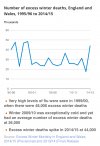Why is it necessary once the vaccines have been rolled out? This needs to stop and Covid needs to be removed from the list of notifiable diseases.
Because the vaccine doesn’t (and can’t) protect everyone. Even with the vaccine fully deployed, there will be around 8-10m people still vulnerable to the illness, being those in the vulnerable groups who could not / would not be vaccinated and those that have but for whom it doesn’t work. Stopping the spread of infection to those people will still be an effective way of reducing the risk to the NHS.
I’d say some form of tracing system lasts for a year or more after all restrictions are eased (hopefully only 15 weeks to go). Personally I have no issue with that.
I’ve no doubt countries such as South Korea have far better tracing systems than ours, but they also haven’t tested many people and have dealt with far worse epidemics previously, which may go a long way to explaining how they appear to have sailed through this relatively unaffected.
Well exactly. They’ve learned from previous experience that a good tracing system is essential to deal with an epidemic.

